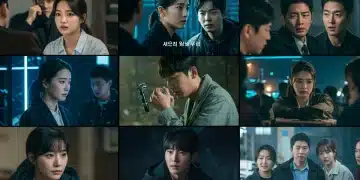Decoding the ‘Will’ in K-Dramas: A Deep Dive into Ambition and Destiny

Will, as a recurring theme in K-dramas, embodies characters’ determination, ambition, and the exploration of destiny versus self-determination, often driving compelling narratives and character arcs.
K-dramas captivate audiences with their intricate plots, compelling characters, and exploration of universal themes. Among these themes, the concept of will stands out as a driving force behind many narratives, shaping the destinies of protagonists and influencing the outcomes of their stories. It’s about grit, ambition, and fighting for what you want.
The Essence of Willpower in K-Dramas
Willpower, or the power of will, is a central theme in numerous K-dramas, often depicted as the unwavering determination of characters to overcome obstacles and achieve their goals. This theme resonates deeply with viewers, reflecting the human desire to control one’s destiny and fight for what one believes in. It’s a tale of resilience, ambition, and overcoming adversity.
K-dramas often use the theme of willpower to explore the complexities of human nature, showcasing both the positive and negative aspects of striving for success. Characters with strong wills are often portrayed as admirable figures who inspire viewers with their perseverance and courage.
The Protagonist’s Journey: A Test of Will
Many K-dramas center around a protagonist who faces seemingly insurmountable challenges. Their journey becomes a testament to their willpower, as they navigate difficult circumstances, overcome personal flaws, and fight against external forces that seek to thwart their ambitions.
The test of will is the backbone of what makes a K-Drama satisfying. It sets the character up to strive, to learn, and to succeed – despite the odds.
The Antagonist’s Resolve: A Darker Side of Will
Willpower is not always portrayed as a positive trait in K-dramas. Antagonists often possess a strong will, which they use to manipulate, control, and inflict harm on others. This darker side of willpower highlights the importance of ethical considerations when pursuing one’s goals.
- Unwavering Determination: The presence of an unshakeable drive to reach a set goal.
- Moral Ambiguity: The use of their “will” for unsavory behavior.
- The Contrast: Highlights the dichotomy in the story, and the use of drive for good, and for bad.
In conclusion, willpower is a multifaceted theme in K-dramas, representing both the admirable determination to achieve one’s goals and the potential for misuse when guided by unethical intentions. It showcases the power of human ambition.
Destiny vs. Free Will: Shaping Your Own Narrative

A common philosophical question is asked within K-Drama: “Is our fate predetermined, or do we have the power to shape our own destinies?” K-dramas frequently grapple with this question, exploring the tension between destiny and free will through their characters and narratives.
The interplay between destiny and free will adds depth and complexity to K-drama storylines, engaging viewers in thought-provoking reflections on the nature of human existence and the choices we make. Where does ambition meet the stars?
The Weight of Destiny: A Preordained Path
Some K-dramas embrace the concept of destiny, suggesting that certain events are predetermined and inevitable. Characters may be bound by fate, their lives unfolding according to a preordained plan. This can create a sense of dramatic irony, as viewers anticipate the inevitable outcome while watching the characters struggle against their fate.
For some K-Dramas, a rigid, unbendable fate is a literary device – but what does it mean to the characters involved?
Embracing Choice: The Power of Self-Determination
Other K-dramas champion the idea of free will, emphasizing the power of individuals to make choices that shape their lives. Characters may defy expectations, challenge societal norms, and forge their own paths, demonstrating that destiny is not necessarily fixed.
- Personal Agency: The idea of a character acting on their own for a desired end result.
- Breaking Free: Refusing to be shackled or confined by expectations and old habits.
- The Power of Choice: The simple point that our decisions lead to different outcomes.
Ultimately, the exploration of destiny and free will in K-dramas encourages viewers to consider their own beliefs about fate and the extent to which they believe they have control over their lives. It questions whether we are puppets, or free agents.
Ambition and Drive: The Fuel for Success
Ambition and drive are powerful motivators that propel characters forward in K-dramas, leading them to pursue their dreams, overcome obstacles, and achieve success. These qualities are often portrayed as essential ingredients for a fulfilling and meaningful life. But what happens when that ambition faces a trial?
K-dramas often depict the sacrifices and challenges that come with pursuing one’s ambitions, highlighting the importance of resilience, determination, and a strong work ethic. Some would argue that you need all three!
The Pursuit of Dreams: Overcoming Obstacles
Many K-dramas feature characters with ambitious dreams, whether it’s becoming a successful entrepreneur, a renowned artist, or a respected professional. These characters often face numerous obstacles along the way, including financial hardships, societal pressures, and personal setbacks.
The ability to push towards a goal, regardless of personal and professional roadblocks makes for an engaging narrative.
The Price of Success: Sacrifices and Compromises
Ambition and drive can come at a price, requiring characters to make sacrifices and compromises in their personal lives. They may have to work long hours, neglect their relationships, or make difficult choices that challenge their values.

It is always interesting to see what a character is willing to sacrifice on their climb to success.
Ultimately, K-dramas use the themes of ambition and drive to inspire viewers to pursue their own dreams with passion, determination, and a willingness to overcome challenges. But is it worth it?
Moral Dilemmas and Ethical Boundaries in K-Dramas
Characters in K-dramas often face complex moral dilemmas that test their values and challenge their ethical boundaries. These dilemmas force characters to confront difficult questions about right and wrong, and to make choices that have significant consequences for themselves and others. What lines will you cross for success?
The exploration of moral dilemmas in K-dramas adds depth and complexity to the narratives, prompting viewers to consider their own values and ethical beliefs.
The Ends Justify the Means: A Risky Proposition
One common moral dilemma in K-dramas involves the question of whether the ends justify the means. Characters may be tempted to engage in unethical or illegal activities in order to achieve a desired outcome, such as protecting their loved ones, exposing corruption, or achieving personal success.
Often in these plots, there is a heavy price to pay for moral flexibility. The question is: How long can the character get away with it?
The Lesser of Two Evils: Choosing the Best Option
Another common moral dilemma involves choosing the lesser of two evils. Characters may be faced with two undesirable options, both of which have negative consequences. In these situations, they must weigh the potential outcomes and choose the option that minimizes harm and aligns with their values.
- Complex Decisions: Highlight the complicated situations characters face.
- Moral Reflection: They remind us to consider both intention and outcome.
- Character Development: How they navigate these dilemmas shows growth.
Ultimately, the exploration of moral dilemmas in K-dramas challenges viewers to think critically about their own values and ethical boundaries, and to consider the consequences of their choices.
Resilience and Perseverance: Bouncing Back from Setbacks
Resilience and perseverance are essential qualities for characters in K-dramas, enabling them to bounce back from setbacks, overcome adversity, and continue pursuing their goals despite challenges. These themes resonate with audiences, reflecting the human capacity for enduring hardship and emerging stronger.
K-dramas often depict the emotional and psychological toll of setbacks, highlighting the importance of self-care, support systems, and a positive mindset when facing difficult circumstances.
The Power of Self-Belief: Never Giving Up
One of the key ingredients for resilience is self-belief – the unwavering conviction that one is capable of achieving one’s goals, regardless of obstacles. Characters with strong self-belief are more likely to persevere through setbacks and maintain a positive attitude.
Is that something you inherently have? Or something you cultivate? Many K-Dramas explore that question.
Finding Strength in Others: Support Systems
Another important factor for resilience is having a strong support system. Characters who have supportive friends, family members, or mentors are more likely to bounce back from setbacks and stay motivated.
A circle of strong people makes all the difference!
Ultimately, K-dramas use the themes of resilience and perseverance to inspire viewers to cultivate these qualities in their own lives, empowering them to overcome challenges and achieve their full potential.
The Role of Mentors and Guides: Shaping Destinies in K-Dramas
Mentors and guides play a crucial role in shaping the destinies of characters in K-dramas, providing them with guidance, support, and wisdom as they navigate their personal and professional lives. These figures often serve as catalysts for growth and transformation, helping characters to overcome obstacles and achieve their full potential.
K-dramas often explore the dynamics of mentor-mentee relationships, highlighting the importance of trust, respect, and mutual learning.
Providing Wisdom and Guidance: Lessons Learned
Mentors and guides offer characters valuable wisdom and guidance, drawing upon their own experiences to help them navigate difficult situations and make informed decisions. They may share advice, offer insights, or provide a different perspective on challenges.
But can you trust their advice?
Offering Support and Encouragement: Believing in Potential
Mentors and guides provide characters with unwavering support and encouragement, believing in their potential even when they doubt themselves. They may offer words of affirmation, provide a safe space for vulnerability, or challenge them to step outside of their comfort zones.
- Empowerment: Helping characters find their inner strength.
- Perspective: Showing different ways to approach problems.
- Motivation: Inspiring them to keep moving toward their goals.
Ultimately, K-dramas use the theme of mentorship to highlight the importance of guidance and support in shaping one’s destiny, emphasizing the transformative power of positive relationships.
| Key Concept | Brief Description |
|---|---|
| 🎯 Willpower | Determination to overcome obstacles and achieve goals. |
| ⚖️ Destiny vs. Free Will | The battle between a preordained path and self-determination. |
| 🌟 Ambition | Drive and passion for a path to success. |
| 🌱 Mentors | The guiding force towards a better self. |
Frequently Asked Questions
▼
The most common theme revolves around a character’s unwavering determination to overcome obstacles and achieve their goals, often highlighting themes of destiny and self-determination.
▼
Antagonists often exhibit a strong “will” manifested as a ruthless drive to achieve their selfish goals, sometimes through manipulation or unethical means, presenting a dark side to this concept.
▼
Mentors play a crucial roles by guiding characters, offering wisdom, and bolstering their resolve during moments of doubt, thereby shaping and strenghtening their overall “will”.
▼
Moral dilemmas frequently arise when characters use their “will” in ways that test ethical boundaries. This prompts characters and viewers alike to reflect on their own values and priorities.
▼
Characters experience hardships such as financial troubles, social stigmas, personal sacrifices, and moments of self-doubt that challenge their “will” and resilience, creating emotional plot twists.
Conclusion
In conclusion, the theme of **will** in K-dramas serves as a powerful and versatile narrative tool, used to explore a range of human experiences, from the pursuit of dreams to navigateing moral dilemmas and overcoming adversity. Through resilience and guidance, K-Dramas teach the power of a dedicated mindset.}





